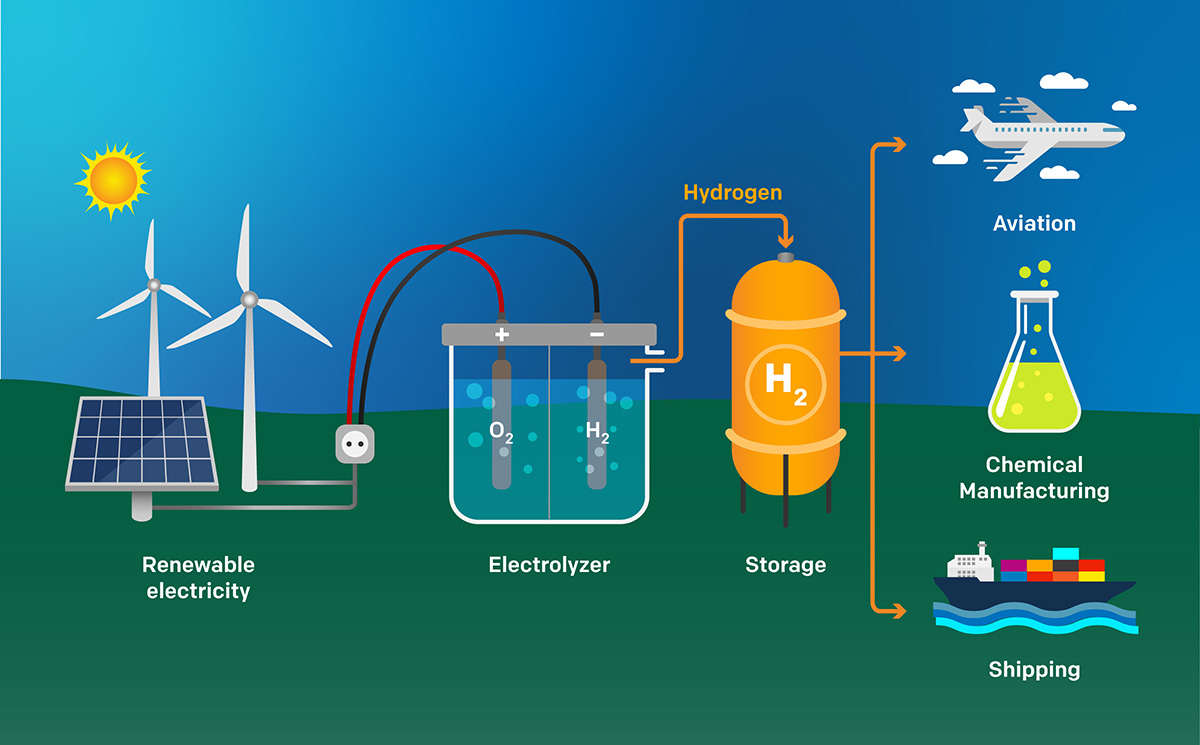Green hydrogen is an emerging fuel that has the potential to revolutionize the energy sector. It is a clean, efficient and renewable source of energy that can be produced using only water and renewable electricity. Unlike conventional hydrogen, which is produced from fossil fuels, green hydrogen is produced from renewable energy sources, such as wind, solar and hydroelectric power. This means that it has a much smaller carbon footprint than conventional hydrogen, making it an important part of the transition to a more sustainable future.
What is Green Hydrogen?
Hydrogen is the most abundant element in the universe, and it is an important component of many important molecules, including water, hydrocarbons, and carbohydrates. In its purest form, hydrogen is a gas that is colourless, odorless and tasteless. It is also highly flammable, making it a potential source of energy.
Green hydrogen is produced using renewable energy sources, such as wind, solar and hydroelectric power. This process involves using an electrolyzer to split water into hydrogen and oxygen. The hydrogen can then be stored and used as fuel, while the oxygen can be released back into the atmosphere.
Green hydrogen has several advantages over conventional hydrogen. Firstly, it is more hygienic and more durable. Conventional hydrogen is usually produced from fossil fuels, which release carbon dioxide and other greenhouse gases into the atmosphere. It contributes to climate change and other environmental problems. On the other hand, green hydrogen is produced using renewable energy sources, which have a very low carbon footprint.
Second, green hydrogen is more efficient. Since it is produced using renewable energy sources, it can be produced in a more decentralized manner depending on where it will be used. This reduces the need for long distance transportation of hydrogen, which can be costly and inefficient.
Ultimately, green hydrogen has the potential to be an important part of the transition toward a more sustainable future. As more countries and businesses commit to reducing their carbon footprint, they will need to find new and innovative ways to produce and use energy. Green hydrogen provides a solution that allows for a cleaner, more efficient and more sustainable energy system.
The Benefits of Green Hydrogen
Green hydrogen has many benefits that make it an attractive option for both consumers and businesses. This includes:
- Low Carbon Footprint: Green hydrogen is produced using renewable energy sources, which has a much lower carbon footprint than conventional hydrogen. This makes it an important part of the transition towards a more sustainable future.
- Energy storage: Hydrogen can be stored and used as a fuel, making it an important part of energy storage systems. This is especially useful for renewable energy sources like wind and solar, which come on intermittently.
- Decentralization: Because green hydrogen can be produced in a more decentralized manner, it reduces the need for long-distance transportation of hydrogen. This can be costly and ineffective, especially in areas where there is high demand for hydrogen.
- Versatility: Hydrogen can be used in a variety of applications including transportation, heating and power generation. This makes it a versatile fuel that can be used in many different industries.
- Job creation: The production and use of green hydrogen has the potential to create new jobs in the renewable energy sector, helping to stimulate economic growth and development.
Applications of Green Hydrogen
Green hydrogen has a wide range of applications, including:
- Transportation: Hydrogen fuel cells can be used to power cars, trucks, buses, and trains. It provides a clean and efficient alternative to conventional fossil fuels.
- Electricity generation: Hydrogen can be used in fuel cells to generate electricity. This is especially useful for remote areas with no access to the electricity grid.
- Heating: Hydrogen can be used to heat buildings, providing a clean alternative to traditional fossil fuels such as natural gas.
- Industry: Hydrogen can be used in industrial processes such as chemical production, metal refining, and glass manufacturing. This can help reduce emissions from these industries and contribute to a more sustainable future.
- Energy storage: Hydrogen can be stored and used as a fuel when renewable energy sources such as wind and solar are not available. This can help overcome the intermittent nature of these sources and provide a reliable source of energy.
Challenges of Green Hydrogen
While green hydrogen has many advantages, there are also many challenges that need to be addressed before it can become a mainstream energy source. This includes:
- Cost: The cost of producing green hydrogen is currently higher than conventional hydrogen. The reason for this is the high cost of renewable energy sources and the relatively low efficiency of electrolyzers. However, as the technology improves and economies of scale are achieved, the cost of green hydrogen is expected to come down.
- Infrastructure: A new infrastructure needs to be developed to produce, store and transport green hydrogen. This can be costly and time consuming, especially in areas where there is no existing infrastructure.
- Safety: Hydrogen is highly flammable and can be dangerous if not handled properly. Additional security measures need to be taken to ensure that it is handled safely.
- Scale-up: Production of green hydrogen is currently limited, and production needs to be scaled up to meet growing demand. This requires significant investment in research and development as well as infrastructure.
- Regulatory Framework: A regulatory framework needs to be developed to ensure that green hydrogen is produced and used safely and efficiently. It includes regulations related to the production, storage, transportation and use of green hydrogen.
Conclusion
Green hydrogen has the potential to revolutionize the energy sector, providing a clean, efficient and sustainable alternative to conventional fossil fuels. Although there are many challenges that need to be addressed, the benefits of green hydrogen are significant, and could play a key role in the transition to a more sustainable future. As the technology improves and economies of scale are achieved, the cost of green hydrogen is expected to drop, making it an attractive option for both consumers and businesses. With the right investments in research, development and infrastructure, green hydrogen has the potential to become a game-changer in the energy sector, helping to reduce emissions and build a more sustainable future.





0 comments:
Post a Comment